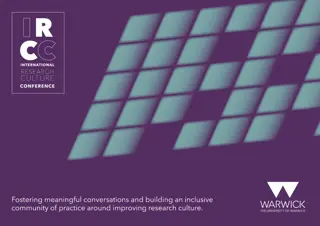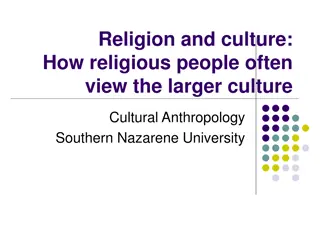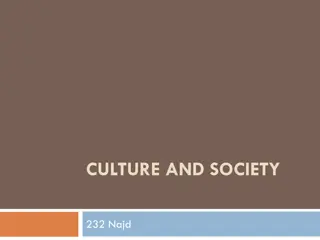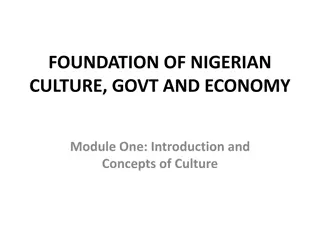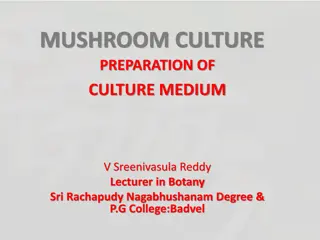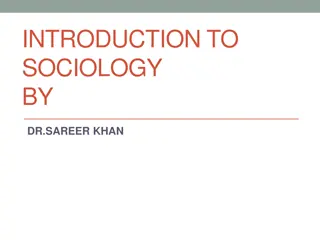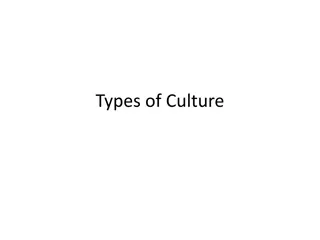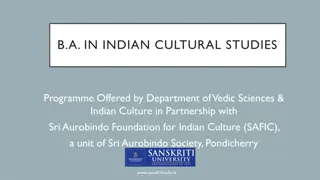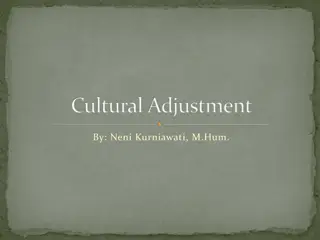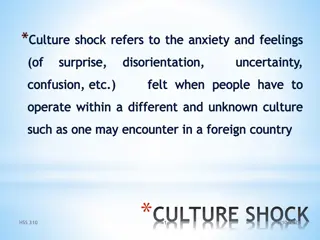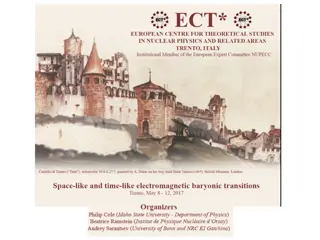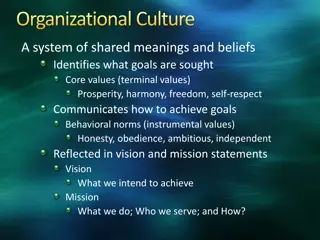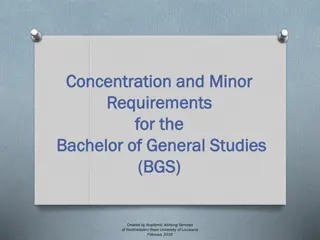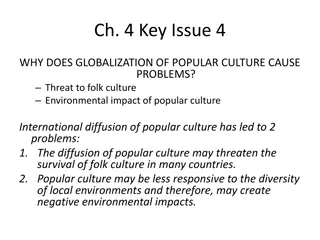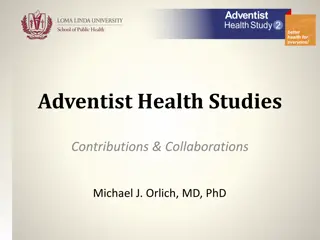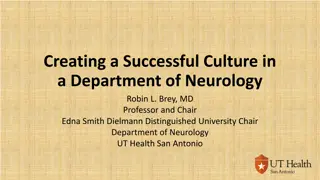IRCC International Research Culture Conference 2023: Empowering Global Communities
Explore the transformative potential of co-production in research and enterprise culture at the IRCC International Research Culture Conference 2023 hosted by Heriot-Watt University. Join Professor Jemina Napier, Dr. Fiona Armstrong, and Catalina Bastidas to delve into developing a purposeful global
10 views • 10 slides
Understanding Organizational Culture and Generational Myths in the Workplace
Explore the impact of organizational culture on employee engagement, the aspects shaping workplace culture, and the debunking of generational myths in the modern workforce. Discover how leadership can create a cohesive culture that benefits employees of all generations.
1 views • 39 slides
Enhancing University of Warwick's Research Culture through Work Experience Programs and Staff Development
This project aims to address social mobility issues in STEM by developing a research culture at the University of Warwick. Through internal funding sources, the project focuses on enhancing work experience programs and enabling staff development to support the wider university community. Key activit
3 views • 12 slides
Perspectives on the Relationship Between Religion and Culture
Religious people often perceive the larger culture in different ways, as illustrated by Richard Niebuhr's classic positions in "Christ and Culture" and Charles Kraft's later perspectives on God's role in culture. These viewpoints range from rejecting cultural influence to integrating Christianity an
1 views • 14 slides
Understanding Organisational Culture and Placement Etiquette
Explore the significance of organisational culture and placement etiquette in the context of thriving in a placement. Understand the impact of aligning personal values with company culture for a fulfilling career. Discover tips on assessing organisational culture during interviews to make informed d
0 views • 7 slides
Understanding Culture and Society
Culture and society are interconnected concepts, where culture encompasses beliefs, behaviors, and objects shared within a community, shaping their identity and values. Society, on the other hand, comprises individuals interacting based on common cultural bonds, whether ethnic, gender-based, or thro
0 views • 12 slides
Latest Research and Studies on Lung Cancer - Update May 2024
This research update includes information on national recruitment to lung cancer studies, comparison of national vs. regional recruitment, and detailed descriptions of various studies and trials related to lung cancer. The studies cover areas such as treatment advancements, observational studies, ma
2 views • 13 slides
Cultivating an Effective Data Culture: Strategies and Insights
Explore the key elements of developing a data-informed culture through national guidance, research insights, and practical considerations. Learn about creating a safe space for collaboration, effective data systems and processes, and the impact of a positive culture on teaching and learning. Gain va
1 views • 24 slides
Understanding Nigerian Culture, Government, and Economy: Module One
Delve into Module One of the course on Nigerian culture, government, and economy with a focus on the Introduction and Concepts of Culture. Explore definitions of culture, various types of culture, characteristics, importance, related concepts, levels, and differences between culture and ethnic group
1 views • 31 slides
Understanding Just Culture in Leadership: Creating a Fair and Error-Preventive Environment
Punitive culture in institutions can lead to mistakes being hidden, affecting error prevention. Dr. Lucian Leape highlights the importance of avoiding punishment for errors, advocating for a Just Culture model. This model, coined by David Marx, recognizes human error and helps differentiate between
0 views • 24 slides
Mushroom Culture: Preparation of Culture Medium and Edible Mushroom Examples
Mushroom culture involves the preparation of culture medium for cultivating various edible mushrooms. This process includes the systematic classification, structure, and examples of edible mushrooms. The medium preparation methods and materials are essential for successful mushroom cultivation. The
0 views • 24 slides
Culture Media
Culture media play a crucial role in isolating bacteria from clinical specimens. Water, electrolytes, peptone, agar, meat extract, yeast extract, and blood/serum are essential constituents used in culture media. These components provide nutrients, solidifying agents, and growth factors necessary for
1 views • 26 slides
Understanding Plant Tissue Culture: Methods and Requirements
Plant tissue culture involves the in-vitro culture of plant explants under aseptic conditions, covering cell, organ, and suspension cultures. This process, pioneered by German botanist Gottlieb Haberlandt, relies on the totipotency of plant cells. Key requirements include laboratory organization, su
0 views • 18 slides
Leading to Safety
Examining the crucial link between organizational culture and safety programs, this content emphasizes the importance of fostering a culture of safety within organizations to ensure the success of safety initiatives. It explores the process of changing organizational culture, starting from defining
0 views • 20 slides
Understanding Culture in Sociology: Key Concepts and Definitions
Culture is the cornerstone of society, distinguishing humans from animals and shaping our social lives. Sociologists define culture as the shared values, practices, norms, and beliefs that govern our interactions and behaviors. This comprehensive guide explores the non-material aspects of culture, i
1 views • 30 slides
Understanding Plant Tissue Culture Media and Their Importance in In Vitro Growth
Plant tissue culture media play a crucial role in the in vitro growth and morphogenesis of plant tissues. The composition of culture media depends on the specific plant species and the type of material used for culture. Various types of media, such as White's medium, MS medium, B5 medium, N6 medium,
0 views • 6 slides
Overview of Cell Culture Methods and Importance in Research
Introduction to the principles of cell culture, including tissue culture, organ culture, and cell culture methods. Discusses the advantages and disadvantages of each technique and highlights the need for cell culture in research for studying cellular behavior and large-scale production of cell mater
3 views • 45 slides
Understanding Popular Culture: Classification and Impact
General classification of culture includes Popular, High/Elite, Low/Subculture, Primary & Secondary, Folk, and Co-Culture. Popular culture, shaped by mass media, encompasses ideas, attitudes, and phenomena favored by society. It influences daily life, with examples like styles of dress, slang, and s
0 views • 16 slides
Overview of Media Studies Disciplines and Historical Development
Media studies is a multidisciplinary field that explores the content, history, and effects of various media, with roots in the relationship between media and culture. Originating in the 1920s, media studies draws on traditions from social sciences and humanities, incorporating theories from discipli
5 views • 18 slides
Understanding Clinical Trials: Types and Designs
Clinical trials are essential research studies that evaluate new tests and treatments to improve human health outcomes. They involve various phases, designs, and purposes, such as treatment trials, prevention trials, and observational studies. Different types of clinical trial designs include experi
7 views • 18 slides
Perspectives on Youth Culture Through Functionalist and Neo-Marxist Views
Functionalist and Neo-Marxist perspectives on youth culture offer contrasting views on its purpose in society. Functionalist theorists emphasize the role of youth culture in providing a transitional phase for young people, aiding in their social integration and development of independence. On the ot
0 views • 11 slides
Understanding Popular Culture and Ideology
Popular culture encompasses the lived practices and artistic products of society, contrasting with high culture. Various definitions highlight its appeal to a wide audience and its distinction from high culture. The relationship between popular culture and ideology is explored through practices that
0 views • 15 slides
B.A. in Indian Cultural Studies Programme by Department of Vedic Sciences & Indian Culture
Explore the B.A. in Indian Cultural Studies programme offered by the Department of Vedic Sciences & Indian Culture in partnership with Sri Aurobindo Foundation for Indian Culture. Delve deeper into the spiritual foundations, history, and key contributions of Indian civilization while preparing for a
0 views • 13 slides
Understanding Cultural Adjustment: Navigating Different Ways of Life
Cultural adjustment involves experiencing culture shock when encountering a new way of life due to immigration, travel, or a shift in social environments. This process includes symptoms like excessive concern, fear of physical contact, and refusal to learn the host country's language. Overcoming cul
0 views • 12 slides
Understanding Culture Shock: Phases, Symptoms, and Coping Strategies
Culture shock is the anxiety and disorientation experienced when adapting to a new and unfamiliar culture. This phenomenon involves various stages, from the honeymoon phase to readjustment and reverse culture shock. Symptoms of culture shock can be physiologically, psychologically, and socially base
1 views • 11 slides
Proposed NRC Safety Culture Policy Statement Overview
This document provides an overview of the proposed Nuclear Regulatory Commission (NRC) Safety Culture Policy Statement presented by Eric Fries, the Safety Culture Program Manager. It covers topics such as NRC's mission, responsibility, safety culture background, draft policy statement, current statu
0 views • 24 slides
Hematological Cancer Clinical Studies Update and Recruitment Statistics
Latest update on hematological cancer clinical studies from the SWAG.Network Haematological Cancer Clinical Advisory Group, including national recruitment data, regional recruitment comparisons, open studies, and sample size information for ongoing studies. This comprehensive update covers a range o
0 views • 14 slides
Plant Tissue Culture Methods for Growth and Reproduction Study
Plant tissue culture methods such as root tip culture, shoot-tip culture, leaf culture, flower culture, and anther and pollen culture allow for the study of growth, reproduction, and genetic variations in plants. These techniques involve culturing various plant parts under sterile conditions to inve
1 views • 20 slides
Advances in Baryon Spectroscopy and Hadronic Matter Studies
Discussions at the meeting focused on interpreting HADES results for e+e- and meson production in hadronic reactions, with studies involving proton, pion, light, and heavy ion beams. The role of time-like electromagnetic transitions, baryon spectroscopy, and connecting hadronic matter studies were e
0 views • 12 slides
Understanding Organizational Culture and Its Impact on Business Success
Organizational culture encompasses shared beliefs, values, and behaviors within a company. It influences goal-setting, strategies, and employee actions. The transmission of culture is vital for aligning values with business practices. Culture matters for client relations, differentiation, and managi
0 views • 17 slides
Understanding Corporate Culture vs. Safety Culture in Organizations
Explore the dynamics of corporate culture and safety culture within organizations through a series of images and quotes. Learn about aligning goals, promoting a culture of safety, and the crucial factors that contribute to a safe workplace environment. Delve into the responsibilities of management,
0 views • 38 slides
Understanding Targeted Clinical Investigation in Pharmacovigilance
Targeted clinical investigation plays a crucial role in pharmacovigilance by further evaluating significant risks identified in pre-approval clinical trials. This involves conducting pharmacokinetic and pharmacodynamic studies, genetic testing, interaction studies, and large simplified trials to ass
0 views • 12 slides
Japanese Studies Program at York University: Honours Minor Degree Program
Japanese Studies Program at York University offers a comprehensive Honours Minor Degree Program in Japanese Studies. This program features courses in Japanese language, culture, and linguistics, utilizing Technology Enhanced Learning for effective education. Students also have opportunities for stud
0 views • 17 slides
Concentration and Minor Requirements for Bachelor of General Studies (BGS)
Bachelor of General Studies (BGS) students at Northwestern State University of Louisiana must complete a concentration consisting of 36 hours, with a minimum of 12 hours at the 3000 and 4000 levels taken at NSU. The popular concentrations are Social Science, Computer & Natural Science, and Arts & Co
0 views • 9 slides
Certificate Courses in Indian Cultural Studies by Department of Vedic Sciences & Indian Culture
Explore month-long certificate courses in Indian Cultural Studies offered by the Department of Vedic Sciences & Indian Culture in collaboration with Sri Aurobindo Foundation for Indian Culture. Delve into India's rich cultural heritage to gain insights into ancient wisdom traditions, prepare for con
0 views • 8 slides
Challenges of Globalization in Popular Culture
Globalization of popular culture presents challenges such as the threat to folk culture and negative environmental impacts. Rising incomes lead to a shift from folk to popular culture, affecting traditional values and clothing symbolism. The adoption of Western clothing in Middle Eastern countries f
0 views • 12 slides
Exploring Pesticide Monitoring and Contamination Studies in Maine
Mary Tomlinson's work with the Maine Board of Pesticides Control includes past studies on groundwater and surface water monitoring, ongoing monitoring initiatives, and future collaborative studies. The State Law mandates residue surveys to identify possible contamination sources and develop a pestic
1 views • 55 slides
Adventist Health Studies Contributions & Collaborations Overview
Adventist Health Studies have made significant contributions to understanding the health and longevity advantages of Seventh-day Adventists, particularly focusing on vegetarian diets and cardiovascular health. With a history spanning over 57 years and various cohort studies, these studies have provi
0 views • 12 slides
Cultivating a Successful Culture in Neurology Department
Importance of culture in a neurology department highlighted by Dr. Robin L. Brey. Emphasis on how culture trumps strategy and the role of leaders in maintaining a positive culture. Examples and insights on how culture influences decision-making and behavior. Attributes of a successful culture and ho
0 views • 21 slides
Building a Food Studies Center at Met College
Establishing a Food Studies Center at Met College, driven by the merging of Food and Wine courses with Gastronomy programs, aims to integrate hands-on and academic approaches to food studies. Drawing inspiration from existing models like the Culinaria Research Centre and the Center for Regional Agri
2 views • 8 slides


